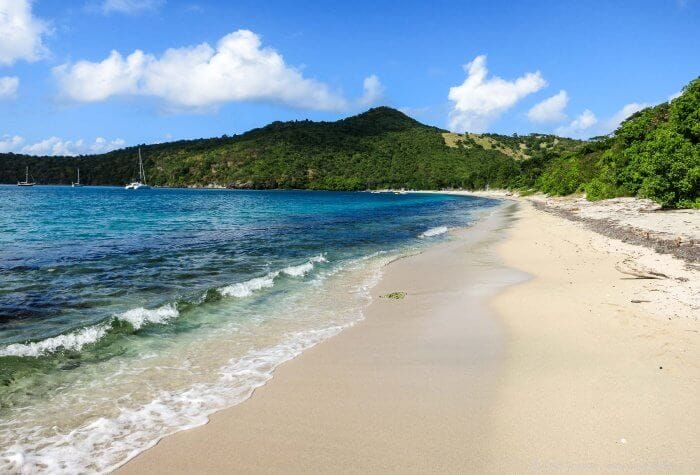
As a young guy learning to sail in the pirate-free (harbourmasters apart) waters of southwest England, I liked nothing better than to sleep in the cockpit of my small cruising boat whenever the weather would allow. Having grown up exploring the wilds with only the most basic of camping kit, this was nothing out of the ordinary for me; I just liked to smell the night air, feel the boat moving beneath me and wake to the wonder of the dawn chorus.
Since those distant days, Louise and I have travelled far and wide on Pèlerin in much more bearable climes than rainy old Britain, but I’ve only slept in the cockpit a very few times. Why? Partly age, no doubt, coupled with a dislike of being bitten by the bugs that abound in tropical places.
But at heart the real reason has to do with security. For it is undeniably true that in many parts of the world it would no longer be wise to sleep in the cockpit, or with the companionway open, in case an intruder were to come aboard.
As we don’t want this to spoil our enjoyment of the cruising life, Louise and I have thought long and hard about security, and we’ve have had to accept that some level of risk exists, and also that it’s up to us to reduce the level of threat to what we deem to be acceptable levels.
In light of this we have developed our own set of thoughts and actions to prevent or defend ourselves from theft or attack. Of course, we can’t actually say that these strategies have worked since we have never been attacked; maybe we’ve simply been lucky. But we’d like to think that they have worked for us, and we offer them here for others to consider while they formulate their own safety parameters for cruising.
Reality vs Gossip
The first thing we do is consider as objectively as possible what the risks actually are in any country we plan to visit. We do our homework thoroughly well in advance, looking for any patterns of crime or particular places that have a bad record of theft or attacks.
We recognize that it is important to consider just how localized the risks are; countries and islands often have an acceptable level of safety overall except for certain individual sites, while in others the risks are more general and inclusive.
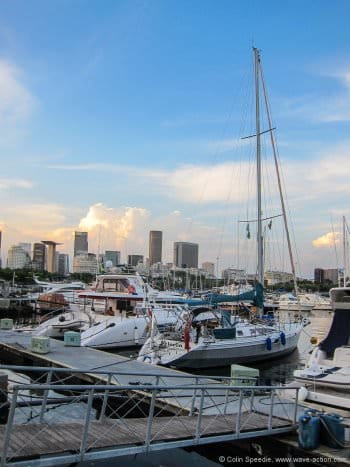
If a place has a reputation for petty crime, we’ll look out for evidence of theft becoming more regular or developing into actual boarding of boats. Crime has a way of escalating as the perpetrators become bolder if they are not caught early on. So petty theft can become boarding, which will almost inevitably degenerate further with the potential to develop into physical confrontation, which seldom ends well.
Hopefully the criminals get caught before it does, but expecting a great deal of help from overstretched police forces or local people who (often with good reason) fear reprisals is in many cases wishful thinking.
If a particular place has a bad reputation, but we’d still like to (or have to) visit, then we’ll try and find out whether that reputation is fair or current. On several occasions, when we have dug a little deeper into the gossip, we’ve learned that there might well have been ulterior motives for attacks on people and property that the basic reports didn’t allow for. In other cases, the attacks had taken place some years before and the perpetrators had been caught and locked up.
We don’t necessarily accept these potentially mitigating factors as gospel on first hearing, and will always seek further confirmation from other sources if possible but, if we feel that the circumstances indicate that the risks are in fact lower than the chat room suggests, then we may consider that, for us, the risks are acceptable.
Learn From The Locals
Once we arrive at a new place, we often ask local people about security—after all, they should know where is safe and where less so. We’ve often found that locals will go out of their way to alert us to potential risks.
On one occasion up a small tributary of a big river in Brazil, we anchored for lunch alongside an island that was a very attractive nature reserve. Just as we were clearing up, two men paddled by in a really battered small pirogue before turning back and coming alongside, obviously wishing to speak.
As we shared absolutely no language, the exchange that followed was minimalistic, to say the least, but by the end of it they had made me very much aware that (a) there were bad men in the village across the big river and that (b) we should under no circumstances stay overnight in this place. The final, slow, drawing of the finger across the throat was all the convincing we needed.
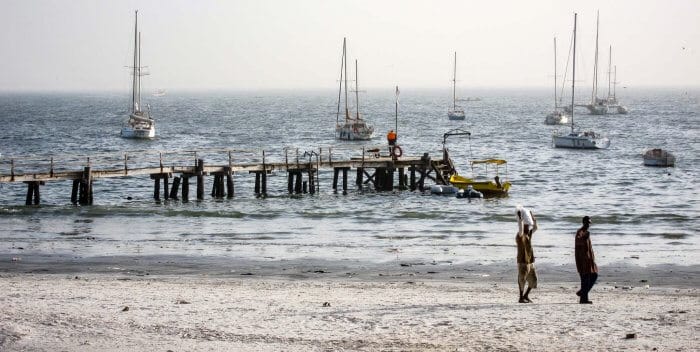
And we have had similar, though less graphic, experiences in Morocco, Senegal and the Cape Verdes, as well as other parts of Brazil and the Caribbean. People are generally good, mean well and, if you’ll give them the chance, will be immensely helpful to you as travellers.
We had heard bad things about all the places mentioned above and, whilst we didn’t dismiss them, we did take care to do our homework diligently before deciding to go there, and are very glad that we did.
Our Golden Rule
We have a rule that if one of us in unhappy in an anchorage, or if we can’t agree that we’ll be safe enough, we simply go elsewhere. After one night in Wallilabou Bay on St Vincent, Louise was feeling very uncomfortable and asked that we should leave, and I couldn’t disagree as the mood of the place was far from relaxing.
Sticking to our rule, we moved on, and thought no more of it until we heard of this year’s tragic occurrence, when a German sailor was shot dead and another wounded during a late night boarding. Such a ghastly scenario—it could so easily have been us.
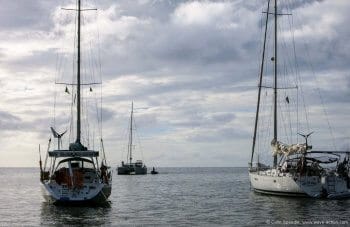
So after two years in the Caribbean, we ended up avoiding the islands of St Vincent and St Lucia altogether, after dubious experiences in both popular cruising destinations, including an attack on a boat near us.
A pity, because we liked them both as places, met some great local people and, in any other circumstances, would love to visit them again. But our antennae are now very finely tuned as to the actual risks and we had to agree, reluctantly, that they were now outside our comfort zone.
Safety In Numbers…or Not
Louise and I would have no trouble agreeing that cities offer far more risks than the wilds, although inexperienced people often find this hard to comprehend. Yet if we ask them whether they think they would be safer on a dark street at midnight in the bowels of their own capital city or in a tiny village on a remote coast, they seldom choose the city.
When we arrived recently in Nassau to leave Pèlerin for a few weeks while we travelled for work, we chose a busy downtown marina that seemed as safe a place as any. Yet within five minutes of arrival, our charming next-door neighbours told us that they had been boarded the night before and had all of their cash stolen.
And over the next few days there were at least two more yachts boarded in the adjacent anchorage, all of these attacks seemingly carried out by a lone swimmer. Yet we’d just spent six weeks anchored out in the Exumas and never had a moment’s concern.
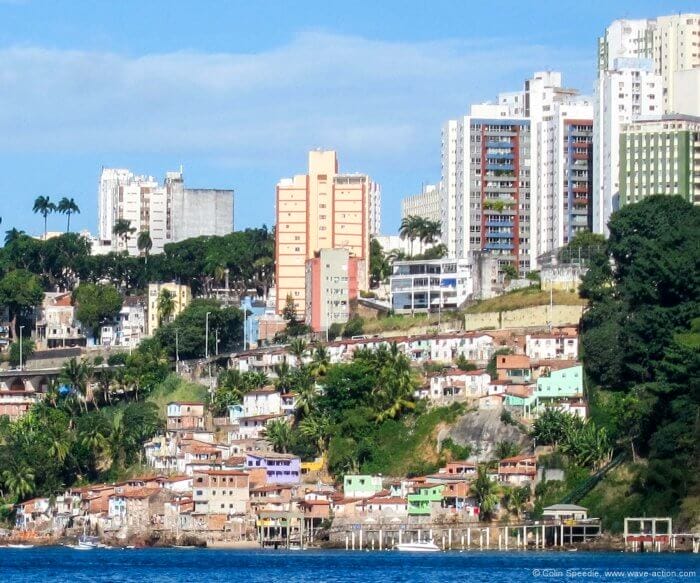
We knew that we’d have to watch ourselves when we arrived in the major Brazilian city of Salvador, as the place has a long and colourful reputation, afloat or ashore. Yet we had to clear in after crossing the Atlantic and re-stock before exploring the magnificent Bahia de Todos os Santos.
We were aware that several boats at anchor right off the city marina in the main downtown business area had been subjected to armed robbery in the months preceding our arrival, and people had been mugged in the street outside our marina at eight o’clock in the morning! Yet we enjoyed several weeks of really enjoyable cruising up the estuaries in the area and farther south towards Rio, often well off the beaten track up rivers, without any incidents.
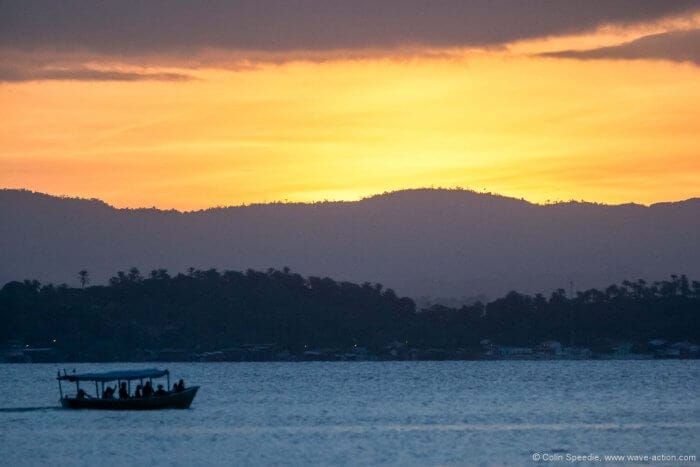
Keeping Our Guard Up
However, we never drop our guard completely. As we made the jump from Trinidad to Grenada in 2013, even though our crossing took place some considerable time after the previous boardings in that area, we sailed overnight when the wind was up, with our navigation lights out as insurance against possible boarding.
Was it a wise move? We’ll never know, but two more recent incidents suggest that it wasn’t just misplaced nerves on our part. Which is a reminder to us as much as anyone else that, even after long spells of safe passagemaking, dormant problems can recur.
Lock Up
When anchored or alongside we always keep our deck hatches locked in the ajar position, except for the forehatch, which is generally open to allow air into the forecabin. But we usually lash our inflatable dinghy upside down over it, which makes it very difficult to enter without making a lot of noise; by which time I should be wide awake and have locked the hatch. The companionway hatch is locked shut at all times—just as we would lock our front door at home in Falmouth!
As we have good-sized dorade vents, we are usually still able to divert sufficient cool air into the cabins to make sleep comfortable, and we have quiet, low current-draw fans in all cabins to keep the air circulating.
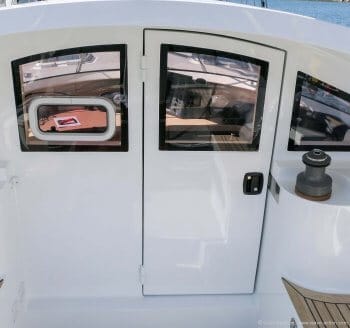
At some stage we intend to have a robust security gate made to fit the companionway door, and perhaps some hatch guards, too, that should allow us to leave at least some of the hatches open at night to achieve better air exchange.
There are some hatch bars on the market such as the Swi-Tec units, but without question the best companionway gates I’ve seen have all been custom fabricated.
We keep all lockers firmly secured with decent padlocks, and the engine, dinghy and fuel tank combination chained and padlocked to the boat. Until recently our dinghy was an ancient Avon with a well-abused Mercury outboard, and I’ve never thought that was a bad idea from a theft perspective. Most of the locals had better kit than us!
More Tips
We close all gates in the guard wires (lifelines) at night, to make life more difficult for anyone trying to board the boat from alongside—any extra warning we have from noise is welcome.
We have a very powerful deck light that we can switch on and a powerful foghorn to alert any boats or security staff around us, although we obviously don’t place much store by this and we establish in advance whether there is a local VHF channel that we can call for assistance on. Grenada, for example, has a repeater on Channel 66 that has proved useful in some incidents.
When in lonely locations we do all of the above as well as the following:
- We tend to explore by day, pick an anchorage and then keep going, only returning in the evening to anchor for the night.
- We don’t stay too long in any one place—usually only one or two nights.
- We’re very alert to passing boats that appear to be taking too much interest.
- We’re very careful around over-inquisitive people afloat or ashore and are alert for unwelcome questions at all times.
- We keep a careful eye on flashily-dressed youths with expensive-looking boats where everyone else is wearing shorts and paddling a dugout.
- We never leave expensive items lying around in plain sight, such as laptops, cameras, smartphones, etc., and are doubly careful with such items ashore.
- If we invite people aboard, we do so ‘by appointment’, so that we have time to stow valuables away from sight.
Managing The Risk
Louise and I accept that risk is part of what we do, but take the management of that risk seriously, and review our thinking regularly and objectively. We’d recommend that others do so, too. That way you’ll be as safe as you can be and enjoy places, people and experiences that might otherwise remain off limits. There’s still a wonderful world out there to explore, despite the risks. Don’t miss out on it!
Further Reading
- Colin’s lyrical account of cruising the Caribbean and Bahamas.
- Transatlantic On “Pèlerin”, Africa, a trans-Atlantic, and Brazil.
Comments
What do you do to keep safe from the earth’s most dangerous predator? Please leave a comment.

Hi Colin,
I quite enjoyed your article and it is a good reminder to not be complaisant in this area. It is one thing to have something you care about stolen: quite another to face injury or worse.
In the Carib and on north, the SSB nets (at least as of 10+ years ago) could be a source of excellent warnings, especially when there are multiple events reported. The net was sometimes disparagingly called the “gloom and doom” net, but, if taken with some common sense, certainly served a function. Less timely, but also a source, is publications such as the bulletins from The Seven Seas Cruising Association.
When talking with neighbors in anchorages, I would often say that, if an alert was necessary for any trouble, to do a short horn 3 times and I would likely hear and know something was up and turn on ch16. I usually meant this only for an anchor dragging, but sometimes for security. Sometimes ch16 was left on all night.
Although it was talked about: in our years in the Bahamas, Carib and Central America, we never felt the need to lock ourselves into the boat at night. Nor would I have hesitated, for security reasons, to sleep in the cockpit in any anchorage I can remember. This was 10+ years ago now, but I would be upset to think that security concerns have escalated that much.
Our stays in marinas were seldom, but it was my take that one had far more worry about theft and pilfering from other cruisers than from locals, even though “the locals” often got accused in general dockside talk. This continues to be my take wherever we are in marinas. I remove snatch blocks etc. from any easy access.
In general, we operate with a “lock it or lose it” headset. It is always a pleasure to be in areas where dinghies and dinghy engines are not a (likely) target as they are so hard to secure (and so important to the cruising life). For dinghy engines, we spray paint the cover (dayglow is not too aggressive to my mind) and generally make it less attractive for stealing. Thieves want something to sell. We also paint the shaft as some parts of the world cover their outboards with T-shirts making finding them after theft more difficult. If the shaft is white, it stands out making it less attractive. This also makes identification easier in the unlikely event of one actually finding a stolen outboard.
As for companionway wash boards, any stainless steel fabricator could make an attractive slide-in (frame with bars the same size as the wash boards) that can allow air while precluding entry (either when away from the boat or asleep inside) far less expensive than the Swi-tec product and be far easier to use (at least from what I could see from the web site).
Thanks again for the article.
My best, Dick Stevenson, s/v Alchemy, Galway, Ireland
Hi Dick
all good thoughts on a complex subject, so thank you for them.
I have no previous visits to call upon to know whether things have actually deteriorated in all areas, but the anecdotal reports seem to report a steady ‘bottom upwards’ increase in crime, starting out with petty theft – and to me, that’s a slippery slope.
Ultimately we must all make our own decisions concerning security and that’s how it should be. My observations and indeed your own bear this out.
The measures we intend to take ourselves will be commensurate with the scale of the problem that we perceive based on honest research, wherever we go. There are still places we hope to visit that wouldn’t be on most peoples bucket list…
Best wishes
Colin
Now there is ,
Coconut Telegraph , and the best is, Caribbean Safety and Security Net – CSSN
al on Facebook.
Thanks Geir – useful stuff that can be used with other inputs to ensure you’re well informed.
Best wishes
Colin
Hi Colin.
An interesting topic, and I have a feeling there are also many good ideas among the readers here that I’d like to hear about….
I’ve never experienced any crime while travelling on boats, but haven’t spent too much time in risky areas (yet), and also try to be aware of the surroundings, which may have helped. One does hear stories, of course, about incidents and defence strategies. The oldest one I remember is Slocum spreading nails on deck at night to stop the barefoot locals in the Maghellan Strait. My preference in self defense is that type of creativity combined with the knowledge seeking awareness Colin describes.
I think it’s worth discussing another type of strategy too. Self defence with weapons. Some cruisers think it’s smart to carry guns and even make that clear to the locals in bad areas. I’m convinced that’s a very very bad idea!
It will most likely increase the probability of a robbery. The worst of the local criminals will know there is a boat worth defending with arms, indicating loads of valuable stuff inside. It will beyond any doubt make any incident way more dangerous. Especially for the boaties. The criminals willing to attack an armed boat are more heavily armed, more able with guns and have no trouble with firing first, at anything moving.
I think that if a robbery is actually happening, the most important strategy is trying to not escalate anything. If the robbers are not dangerous, they will run away the very moment they notice someone is awake. If they don’t, we need to behave non threatening. We need to not encourage violence. We need to calm down and probably cooperate.
Most likely, everybody here agree with me about weapons, but I’ll still repeat what I think is quite important:
I believe in smart preparation of the boat and equipment, smart use of collected information about the place and smart behaviour when interacting with the locals.
I think weapons are almost always extremely stupid!
Spitzbergen being an exception, where guns are mandatory, because the locals you should fear can weigh more than 500 kilos, have huge teeth and white fur. However, I do think that bringing one of those locals may be a fairly efficient crime deterrent in other parts of the world. 🙂
In addition to the tacks-on-deck trick, Joshua slocum carried (and used) a rifle to successfully fend off pirates. A firearm is an extremely effective deterrent and welcomed tool when you need it, but with today’s differing laws and regulations, the cost for willful or unwillful disregard for the myriad legalities is more likely to invite a legal nightmare than to save your life.
Honestly, although I’m a permitted concealed weapons carrier in my state, I fear foreign jails and boat confiscation more than any potential intruder. In slocum’s day, I’d be armed without hesitation. But today, the cost-benefit equation pivots greatly on where you plan to travel and frankly who you are. I got a kick out of Sail Magazine’s February article, “Gun-toting Granny’s Solo Transpac.” It described how great grandmother, Susan Heckly, three days out of the sea of Cortez, enroute to Hawaii, fended off two men in a panga at 2am as they were hanging off the rails and shouting at her. She said, “I grabbed my 12ga pump shotgun, cycled a round into the chamber, and soon we were on the same page.”
So here’s a 70+ year-old former Army nurse with a shotgun in Mexico. Makes perfect sense for HER, since the down side for firearm possession in Mexico would be negligible as compared to me — male gringo. I’d rather die onboard my boat than in a Mexican prison, thank you very much.
In any event, certain personalities are unsuited to firearms in general and should just unburden themselves of the decision entirely. I don’t believe that carrying a firearm onboard is categorically stupid, just potentially not worth the trouble. What IS stupid is the idea of brandishing one or even talking it up “so others know you have it onboard.” If you’re carrying, just know the laws and keep your damned mouth shut.
Hi Brian
thanks for some sensible thinking and comments on this subject. I’ve never had anyone convince me that carrying a firearm is worth the downsides.
Best wishes
Colin
Hi Stein
this is a thorny subject that polarises thinking, but for what it’s worth I’m with you entirely, for many of (and more) reasons that you state.
Best wishes
Colin
Hi Colin,
I now live in the northern Rocky Mountains, far (too far!) from the ocean. In spite of being in the country of Guns For All, the most significant danger when rambling around in the woods is the alpha predator, Mr. Grizz. Existing bear spray is a powerful defense agent if administered correctly. I’ve personally seen it drop an overly inquisitive moose to its knees, but fortunately never had to use it against a bear.
If I sail again in places in the Caribbean that may be a bit sketchy I’ll have two outlets piped into the cockpit with the ability to flood it with bear spray from inside, with a closed and sealed companionway door keeping it out of the boat interior.
Hi Richard
well that’s an alternative that most likely won’t leave you banged up in some terrible island jail!
But isn’t it a pity that we have to even think about such options?
Best wishes
Colin
It is a pity and while I don’t excuse criminality, the fact that relatively rich Westerners (even if not so rich by Western standards, a boat being their only home in some cases) show up in poor places, I can understand it rubbing certain people the wrong way. Not excusing it, but explaining it. That said, there’s good people everywhere, but the bad ‘uns are liable to be worse if they see cruisers as a renewable resource.
Hi Marc
I’ve written about this before in some of my destination posts. Whilst it’s true that there are a small minority of people who flaunt their wealth in poverty stricken places, the bigger problem is that even those of us who downplay our wealth (not hard in our case!) still appear – and in fact, are – wealthy beyond the wildest dreams of the majority of the population in many of the places we all like to visit.
And we now live in a very acquisitive world, and every year there are more mouths to feed….
Please don’t think I’m excusing criminal behaviour – I’m not, and the point you make is a fair one. I just think we need to look a little further into a growing problem and try harder to come up with equitable answers.
Best wishes
Colin
I agree, but Malthusian theories are best expressed on islands, or so it would seem, and maybe part of the problem is just sheer “too many people, not enough resources/work to support them.” As a human, I try to be sensitive to potential solutions, but as a human cruiser, my instincts are simply to avoid places that look like they are going downhill in terms of seeing visitors as easy targets. We are shoving off relatively soon, but were I 25 looking to cruise at 50, I would have doubts about that world being as amenable as today to the idea of a couple or a family showing up in a 40 footer to “explore”.
We have never worried about sleeping in the Cockpit and have taken all reasonable precautions against theft, so the only items ever stolen in 20 years were our very rusty salt encrusted bicycles, the strong securing chains being cut through with bolt cutters.
We have never carried Firearms, with the exception of Spitsbergen, even though we have UK licenses, as the rules and regulations in other Countries are not worth the hassle.
I would however advocate the use of a motion sensor triggered Camera trained on the Cockpit linked to a deck flood light and possibly a Blue Flashing light on the Cross Trees.
We try to make friends of and with the Locals wherever we are, having done so we find that our Yacht and possessions are kept under a watchful eye.
Hi James
thanks for your comment. Like yourselves we have always tried to develop good relations with local people wherever we are and it is certainly our impression that most people are good and will look out for you.
But there’s always a tiny minority (and they’re in every country) who are basically criminal and potentially violent. And as I’ve outlined, it does seem as if the base level of criminality is steadily rising, which is always a worrying thought.
In an increasingly unequal world, we would all do well to follow your advice to work towards good relations with local people and hopefully help to spread the some income around – legally.
Best wishes
Colin
Our boat always has a accessible fire arm. Call me stupid but I fail to see the difference between
a large four legged animal with teeth and a two legged animal with a weapon. You have a moral
obligation to defend your family and friends life, liberty and property.
Please do not hurt me, just take my stuff is not a strategy. It just creates more wolves. The world has always been a dangerous place. Our forefathers would never thought of leaving port with out being heavily armed. You are on your own. The police are there to write the report. As for being asked by authorities if I have fire arms on board ( no I do not ). I will deal with that in the unlikely event that I ever have to with the complete understanding that I had the choice not to be a pacifist victim.
Hi Dave
I’m sorry to read that you believe the world is such a dangerous place. The experience of most Cruisers seems to be that people are friendly and helpful. There is enough Information available to avoid the anchorages which are the equivalent of dangerous inner-city areas. If one was to use an undeclared weapon in almost any country, even when used to prevent a robbery for example, one would face a long prison term, even maybe the death Penalty if a robber was killed. Would not a better strategy to protect your loved ones be to research and avoid those areas known to have a high level of risk?
Regards
Bill
Hi Bill
I could not agree with you more. Never sail to uncivilized places. How ever that being said the sad truth is very bad things can happen anywhere. I will take my chances with the local law and not with a violent criminal.
The real argument is whether you should defend yourself and family in the face of danger. Once that decision is made then you have to choose your weapon. Would you be as upset if I chose a winch handle or a gaff? Or is it the act of resistance and self defense that is unacceptable?
All I can tell you is that there would be no civility with out violence or the threat of violence against the forces of evil.
Hi Dave and everyone,
My take is that one can cruise widely and, using decent judgment, be as safe or safer out cruising as living most any life on land. Bad stuff can happen anywhere anytime, but thankfully, rarely.
The vast majority of us are complete amateurs when it comes to handguns. Handling a handgun is a full time responsibility. One needs to practice the use of the gun as well as regular practice in exercising the judgment as to when it is to be used. The latter being far more important. And, with a handgun, one needs to be prepared to shoot to kill first and find out whether you were correct in your judgment later. It is this latter responsibility that I believe to be most powerful argument against firearms as personal protection.
Dave: If you agree with my take that bad stuff can happen as readily on land as shore, do you intend to carry off the boat in the countries you intend to visit? If you can go ashore without firearms, then surely you can cruise most areas without. You are more likely in danger on shore side visits than on the boat.
In any case, I would want you to choose differently. Both shore and boat firearms are illegal in almost all countries of the world aside from the US. I do not want to be in your wake any more than I would want to be in the wake of someone who reneges on their marina bill or any other illegal activity. If you can’t abide by a country’s laws, then do not go there and do not contaminate it for others.
I admit it is all unlikely, but it is largely the head-set that I am writing about. God forbid it not be theoretical. But it is far from theoretical to follow in the footsteps of other cruisers who feel that they can do as they please, have done so, and left bad feelings behind that affect the cruisers who follow.
I would urge you to reconsider your intention to engage in serious criminal activity in the cruising grounds we all enjoy.
Dick Stevenson, s/v Alchemy
Hi Dave.
I respect your view, but I am (I suppose) a wimp. I spent 14 years as a professional soldier in the Royal Marines. I have seen at first hand the effects of firearms on the human body which has given me an abhorence of weapons. As to using a winch handle or marlin spike, I would have no theoretical problem – but practically they wouldn´t be much use. In view of my age, and the age of a potential attacker, physical resistance would probably make things worse. I suppose I could take up cage fighting as a hobby.
😉
My preferred approach will remain to avoid areas which are deemed to be risky, and to accept the small remaining risk. Without being paranoid, if one remains vigilant one can reduce the risks. Very often, a potential mugger/attacker will pass on when he (or she, what a sad reflection) sees that the potential target is not a soft one. My experience in Internal Security Operations confirms this. If you look “ready to rumble”, then you are probably not the ideal target.
Unfortunately the firearms debate can never be really resolved, as both sides have good arguments, and are convinced of their stance. The tragic events in Nice show that neither side (firearms vs avoiding dangerous areas) have the perfect answer.
Regards
Bill
Hi Dick
Now that you have deemed me a undesirable and persona non grata for violating the laws of most countries and for believing in the natural right to defend oneself. I am really at a loss. Is it the concept of self defense or is it prejudice against my choice of weapons that you have a problem with? Am I the problem minding my own busines or is the problem the theives and murderers? Would you be OK if I chose a cross bow……sword…….ax……..boarding pike? I really am not proficient with any of the above. Do you know which boats around you have weapons? Is it OK if those boats have government sanctioned weapons on board?
As you are well aware that anything can be used as a weapon. The weapon is never to blame, it is the intent of the individual to do good or harm that counts.
In all seriousness, I have no problem with your choice not to defend your self but do not include me in your decision.
Hi Dave,
I am sorry that you did not get my point.
It is not your right to defend yourself or family. It is not your choice of weapon. Although I have caveats in those realms also.
Your choices are not in a vacuum nor are they isolated from affecting others.
I see cruisers as part of a loose and wonderful community that tolerates, even embraces, a wide range of personalities, vessels, interests etc. In the scheme of things, we are largely left on our own and I would wish that to continue. To that end, I believe we need to “police” ourselves and question our fellow cruisers when they do things that jeopardize the community and its generally gracious welcome across the globe.
Take, for example, an ill prepared vessel leaving the Chesapeake with a poor weather window to go around Cape Hattaras. I might try to talk him out of leaving. My justification for doing is that: if too many recreational vessels need to be rescued, some government office will be generated to give offshore licenses.
Another: When a cruiser tells me that I can come in late and leave early so as to not pay a mooring fee, I would want the community to confront this behavior and call it what it is: stealing.
I suspect you get my drift.
You are anticipating doing something which is seriously illegal in most of the countries where we cruise and are guests. I would very much appreciate it if you would reconsider.
My best, Dick Stevenson, s/v Alchemy
Hi Dave.
I think much wisdom has already been shared here, but I have a feeling you and many with you, might still think weapons are good for “protection”. If we want to carry guns or not, our goal with that choice is to make our cruising safer. The question is, do guns have that effect?
There is no discussion that some times, yes it does. If we’re in a situation where someone is actually attacking us and they have intentions of murder, and we know that for sure, having guns will increase our chance of survival. We will most likely still not stand a chance against more people with heavier guns, more skill and one simple target. We might still win a shootout, so when the alternative is certain death, carrying guns is better than not carrying them.
The next question then is, are there situations where having guns in the boat make us less safe? Again there is no discussion whatsoever that YES, sometimes carrying guns will severely increase the danger for ourselves and our family being killed. A scenario:
We’re sailing a dark night in open waters not too far from a coast. Suddenly we see two smaller boats with no navigation lights very close to us. They both put strong lights on us and clearly want something. We blinded and cannot see anything on the boats.
A: They are pirates planning to steal what they can and kill us.
B. They are the same but will only kill if necessary.
C. They are fishers with engine trouble and want to attract help.
D. They are police looking for illegal activity. Elite trained and heavily armed.
Loads of other legit possibilities.
So:
A. Having guns will only improve our chances.
B. Guns might help us, but most likely will make a bad situation WAY worse.
C. Guns are irrelevant, unless we think they’re attacking and shoot at them, which will destroy our lives just as badly as getting killed.
D. If we’re smart and don’t shoot, the guns will at least cause a LOT of hassle and cost. Probably worse. If we’re stupid and try a defence, our boat will I immediately be turned i to hell and we’ll certainly die. If we have no guns onboard, they will behave nice while looking through papers and the boat.
The third question then. Does A happen more frequently than B, C, D and all other legitimate situation? Obviously not even close. Almost all encounters like these are completely unrelated to crime.
The final question: Can we decide which alternative we’re faced with early enough to make the right decision? Meaning, is there any reasonable probability that we can get in a position where our guns will actually help our safety? In real life, no f***Ing way! No actual attackers will show you their intentions. Quite the opposite. They will do their best to look like something else. If they’re actually of the A category, we’ll know that at the moment they shoot. That’s too late to make a difference. If we behave in a way that will make us able to make a difference with our guns, all the other much more frequent situations will transform into something very bad for ourselves.
I’ve never experienced A or B, but have experienced C and D. They will make you nervous as hell, but mostly end up being quite nice encounters, IF we behave smartly. Dave, you say. “You have a moral obligation to defend your family and friends life, liberty and property.” Those words are all positive, but they are emotional, only. They cannot change any facts. No sane evaluation of this topic can possibly conclude that guns onboard is generally increasing our safety. Guns onboard might be the single biggest threat to our cruising safety.
Hi Stein,
Brilliant analysis, thank you. I can back you up by saying that in over 20 years of cruising I have never had an A (obviously) nor a B but have had several Ds and a C. My C was a drunk staggering onto my boat in St John (Canada). If I had shot him I would still be in prison.
As to B type encounters that end badly, we only need to think about one that occurred in South America some years ago. One person died. The person that went for a gun. His name was Sir Peter Blake.